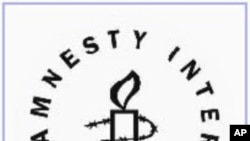Amnesty International says several governments in the Asia-Pacific region heightened their crackdown on political dissent in 2011, in an attempt to tighten their grip on power following uprisings in the Middle East and North Africa.
The group's 50th annual report on global human rights said Thursday that activists and journalists in Asia were inspired by the so-called Arab Spring to stand up for their rights and call for political reform.
But the group said those calls were largely met with a heavy-handed response by governments intent on staying in power. It particularly criticized China for detaining and harassing dozens of government critics in what it called "one of the worst political crackdowns since the Tiananmen Square protests of 1989."
In North Korea, Amnesty said there was no improvement to an already "horrific" human rights record after Kim Jong-Un came to power following his father's death late last year. It said those deviating from official ideology could join thousands already detained in the country's many political prison camps.
The report also accused other Asian countries of stifling dissent using less violent means, noting that both Burma and Vietnam have intelligence agencies that are dedicated to intimidating and silencing critics. The report also criticized newly elected Thailand Prime Minister Yingluck Shinawatra for failing to stop the enforcement of a lese majeste laws, which prohibit any criticism of the royal family.
Amnesty also said ethnic minorities in Asia continue to face discrimination and sometimes violence. The report said at least a dozen Tibetans set themselves on fire last year to protest what they see as repressive Chinese rule of their region. It also lamented that the Burmese military stepped up their campaign against armed rebel groups in 2011, displacing tens of thousands of civilians.
But it praised Burma's new nominally civilian government for releasing more than 300 political prisoners and allowing democracy leader Aung San Suu Kyi to successfully run for parliament. The group said it hopes recent political reforms in Burma emboldens other activists in the Asia-Pacific to push for change in their countries in the coming years.
Asian Governments Stifled Dissent Amid Arab Spring Protests: Amnesty




